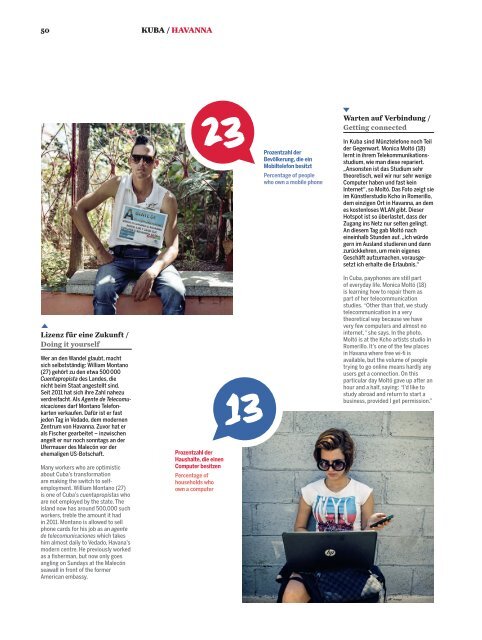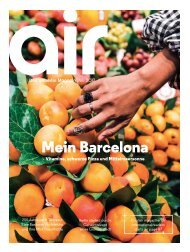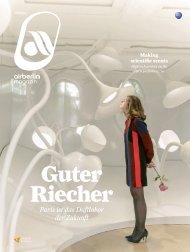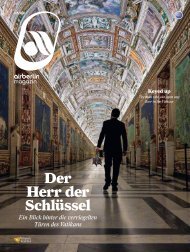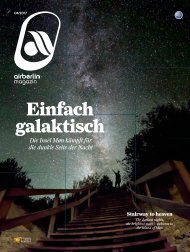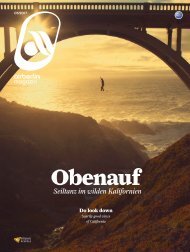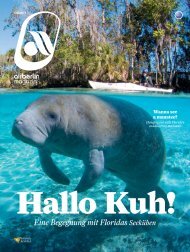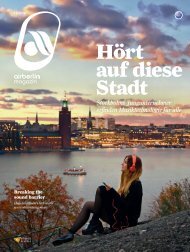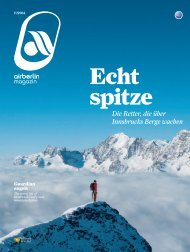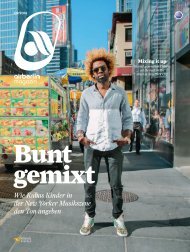Create successful ePaper yourself
Turn your PDF publications into a flip-book with our unique Google optimized e-Paper software.
50 KUBA / HAVANNA<br />
Warten auf Verbindung /<br />
Getting connected<br />
Prozentzahl der<br />
Bevölkerung, die ein<br />
Mobiltelefon besitzt<br />
Percentage of people<br />
who own a mobile phone<br />
In Kuba sind Münztelefone noch Teil<br />
der Gegenwart. Monica Moltó (18)<br />
lernt in ihrem Telekommunikationsstudium,<br />
wie man diese repariert.<br />
„Ansonsten ist das Studium sehr<br />
theoretisch, weil wir nur sehr wenige<br />
Computer haben und fast kein<br />
Internet“, so Moltó. Das Foto zeigt sie<br />
im Künstlerstudio Kcho in Romerillo,<br />
dem einzigen Ort in Havanna, an dem<br />
es kostenloses WLAN gibt. Dieser<br />
Hotspot ist so überlastet, dass der<br />
Zugang ins Netz nur selten gelingt.<br />
An diesem Tag gab Moltó nach<br />
eineinhalb Stunden auf. „Ich würde<br />
gern im Ausland studieren und dann<br />
zurückkehren, um mein eigenes<br />
Geschäft aufzumachen, vorausgesetzt<br />
ich erhalte die Erlaubnis.“<br />
Lizenz für eine Zukunft /<br />
Doing it yourself<br />
Wer an den Wandel glaubt, macht<br />
sich selbstständig: William Montano<br />
(27) gehört zu den etwa 500 000<br />
Cuentapropista des Landes, die<br />
nicht beim Staat angestellt sind.<br />
Seit 2011 hat sich ihre Zahl nahezu<br />
verdreifacht. Als Agente de Telecomunicaciones<br />
darf Montano Telefonkarten<br />
verkaufen. Dafür ist er fast<br />
jeden Tag in Vedado, dem modernen<br />
Zentrum von Havanna. Zuvor hat er<br />
als Fischer gearbeitet – inzwischen<br />
angelt er nur noch sonntags an der<br />
Ufermauer des Malecón vor der<br />
ehemaligen US-Botschaft.<br />
Many workers who are optimistic<br />
about Cuba’s transformation<br />
are making the switch to selfemployment.<br />
William Montano (27)<br />
is one of Cuba’s cuentapropistas who<br />
are not employed by the state. The<br />
island now has around 500,000 such<br />
workers, treble the amount it had<br />
in 2011. Montano is allowed to sell<br />
phone cards for his job as an agente<br />
de telecomunicaciones which takes<br />
him almost daily to Vedado, Havana’s<br />
modern centre. He previously worked<br />
as a fisherman, but now only goes<br />
angling on Sundays at the Malecón<br />
seawall in front of the former<br />
American embassy.<br />
Prozentzahl der<br />
Haushalte, die einen<br />
Computer besitzen<br />
Percentage of<br />
households who<br />
own a computer<br />
In Cuba, payphones are still part<br />
of everyday life. Monica Moltó (18)<br />
is learning how to repair them as<br />
part of her telecommunication<br />
studies. “Other than that, we study<br />
telecommunication in a very<br />
theoretical way because we have<br />
very few computers and almost no<br />
internet,” she says. In the photo,<br />
Moltó is at the Kcho artists studio in<br />
Romerillo. It’s one of the few places<br />
in Havana where free wi-fi is<br />
available, but the volume of people<br />
trying to go online means hardly any<br />
users get a connection. On this<br />
particular day Moltó gave up after an<br />
hour and a half, saying: “I’d like to<br />
study abroad and return to start a<br />
business, provided I get permission.”


